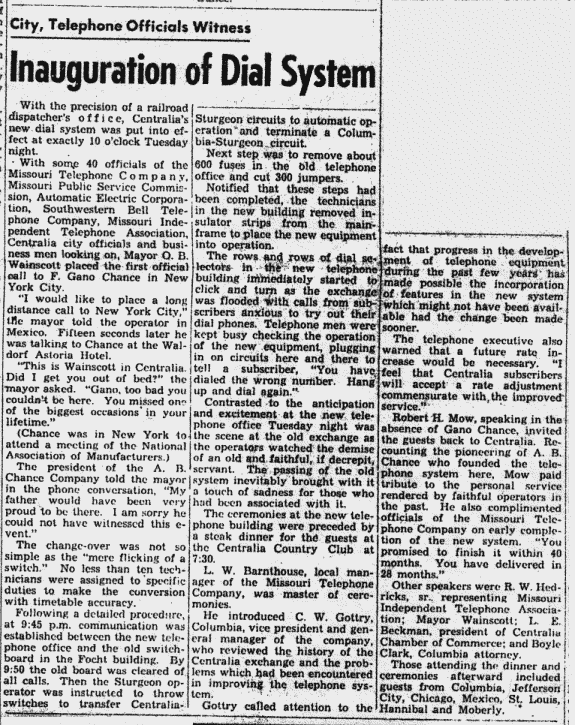A more-readable transcription of this newspaper article is below the scan.

From the front page of the Centralia Fireside Guard of December 2, 1954:
With the precision of a railroad dispatcher's office, Centralia's new dial system was put into effect at exactly 10 o'clock Tuesday night.
With some 40 officials of the Missouri Telephone Company, Missouri Public Service Commission, Automatic Electric Corporation, Southwestern Bell Telephone Company, Missouri Independent Telephone Association, Centralia city officials and business men looking on, Mayor O. B. Wainscott placed the first official call to F. Gano Chance in New York City.
"I would like to place a long distance call to New York City," the mayor told the operator in Mexico. Fifteen seconds later he was talking to Chance at the Waldorf Astoria Hotel.
"This is Wainscott in Centralia. Did I get you out of bed?," the mayor asked. "Gano, too bad you couldn't be here. You missed one of the biggest occasions in your lifetime."
(Chance was in New York to attend a meeting of the National Association of Manufacturers.)
The president of the A. B. Chance Company told the mayor in the phone conversation, "My father would have been very proud to be there. I am sorry he could not have witnessed this event." [Note: Gano Chance's father, A. B. Chance, established the first telephone system in Centralia.]
The change-over was not so simple as the "mere flicking of a switch." No less than ten technicians were assigned to specific duties to make the conversion with timetable accuracy.
Following a detailed procedure, at 9:45 p.m. communication was established between the new telephone office and the old switchboard in the Focht building. By 9:50 the old board was cleared of all calls. Then the Sturgeon operator was instructed to throw switches to transfer Centralia-Sturgeon circuits to automatic operation and terminate a Columbia-Sturgeon circuit.
Next step was to remove about 600 fuses in the old telephone office and cut 300 jumpers.
Notified that these steps had been completed, the technicians in the new building removed insulator strips from the mainframe to place the new equipment into operation.
The rows and rows of dial selectors in the new telephone building immediately started to click and turn as the exchange was flooded with calls from subscribers anxious to try out their dial phones. Telephone men were kept busy checking the operation of the new equipment, plugging in on circuits here and there to tell a subscriber, "You have dialed the wrong number. Hang up and dial again."
Contrasted to the anticipation and excitement at the new telephone office Tuesday night was the scene at the old exchange as the operators watched the demise of an old and faithful, if decrepit, servant. The passing of the old system inevitably brought with it a touch of sadness for those who had been associated with it.
The ceremonies at the new telephone building were preceded by a steak dinner for the guests at the Centralia Country Club at 7:30.
L. W. Barnthouse, local manager of the Missouri Telephone Company, was master of ceremonies.
He introduced C. W. Gottry, Columbia, vice president and general manager of the company, who reviewed the history of the Centralia exchange and the problems which had been encountered in improving the telephone system.
Gottry called attention to the fact that progress in the development of telephone equipment during the past few years has made possible the incorporation of features in the new system which might not have been available had the change been made sooner.
The telephone executive also warned that a future rate increase would be necessary. "I feel that Centralia subscribers will accept a rate adjustment commensurate with the improved service."
Robert H. Mow, speaking in the absence of Gano Chance, invited the guests back to Centralia. Recounting the pioneering of A. B. Chance who founded the telephone system here, Mow paid tribute to the personal service rendered by faithful operators in the past. He also complimented officials of the Missouri Telephone Company on early completion of the new system. "You promised to finish it within 40 months. You have delivered in 28 months."
Other speakers were R. W. Redricks, sr., representing Missouri Independent Telephone Association; Mayor Wainscott; L. K. Beckman, president of Centralia Chamber of Commerce; and Boyle Clark, Columbia attorney.
Those attending the dinner and ceremonies afterward included guests from Columbia, Jefferson City, Chicago, Mexico, St. Louis, Hannibal and Moberly. [Note: "Mexico" as in Mexico, Missouri, about 16 miles east of Centralia.]